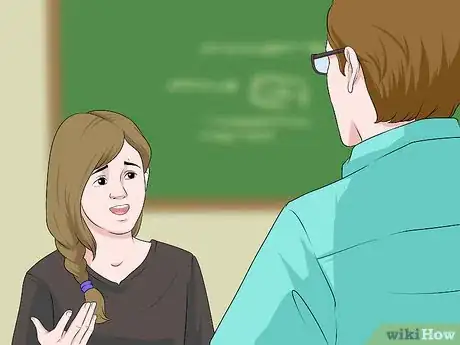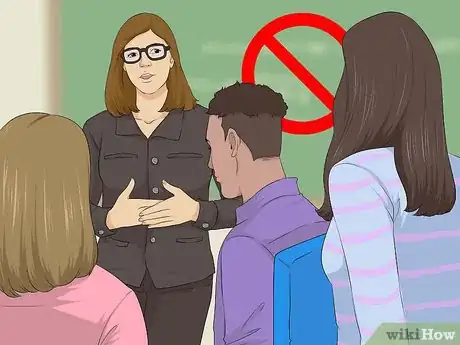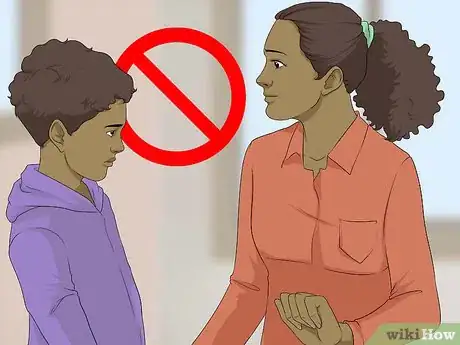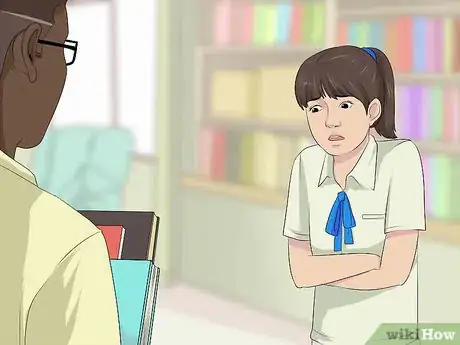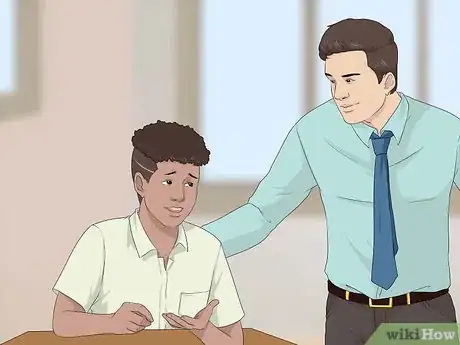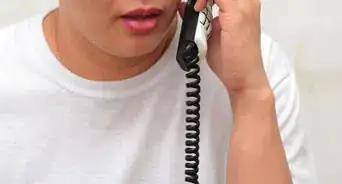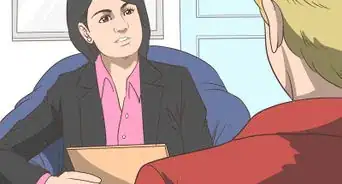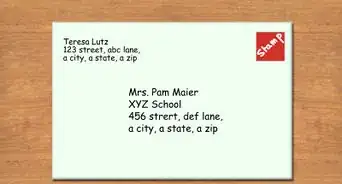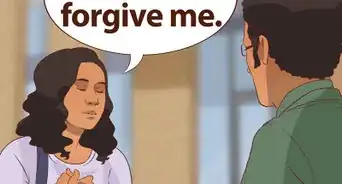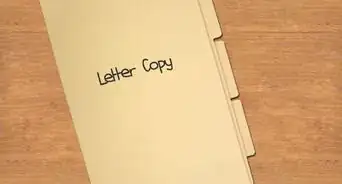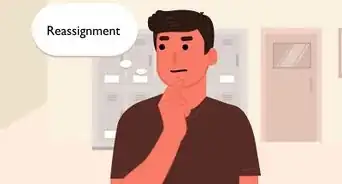This article was co-authored by Alicia Oglesby. Alicia Oglesby is a Professional School Counselor and the Director of School and College Counseling at Bishop McNamara High School outside of Washington DC. With over ten years of experience in counseling, Alicia specializes in academic advising, social-emotional skills, and career counseling. Alicia holds a BS in Psychology from Howard University and a Master’s in Clinical Counseling and Applied Psychology from Chestnut Hill College. She also studied Race and Mental Health at Virginia Tech. Alicia holds Professional School Counseling Certifications in both Washington DC and Pennsylvania. She has created a college counseling program in its entirety and developed five programs focused on application workshops, parent information workshops, essay writing collaborative, peer-reviewed application activities, and financial aid literacy events.
This article has been viewed 27,812 times.
If you've overreacted to your teacher, you should take the time to make a meaningful apology. Start by thinking about how and why you overreacted. Don't try to show how you were right, but hold yourself accountable for your actions. Try to apologize in person and in private, and use body language that shows your genuine remorse. Explain how you plan on behaving better in the future, and make sure you actually stick to your words. Finally, consider taking steps to dealing with any stress or difficulties you might be facing that led to your overreaction.
Steps
Planning a Meaningful Apology
-
1Avoid trying to prove that you were right. If you want to make a good apology, then your main motivation should be to remedy the situation, not to prove that you were right. Start out by thinking about how you overreacted and why it was wrong.
- If you’re feeling any regret, think hard about what it is exactly that makes you feel regretful. Think about your feelings so that you can turn them into meaningful statements.
- For example, ask yourself, "Am I feeling embarrassed or like I did something wrong? What was it about my reaction that makes me feel embarrassed? What do I wish I did differently so I wouldn't feel this way?"
- Once you can state clearly what you regret about your overreaction, think about how the situation could have went differently. Think about how the conversation might have gone if you hadn’t overreacted.
-
2Put yourself in your teacher’s shoes. Think about how whatever you said or did affected your teacher. Consider all the stress they might be under, and how much disrespect they might have to put up from students.[1]
- If your teacher has a reputation for being mean, remember that “good” or “bad” reputations don’t make a teacher good or bad. You wouldn’t want other people to make assumptions about you based on a false reputation.
- Think about how difficult it is to be a teacher. It is an incredible challenge to have a classroom full of kids, to be responsible for their wellbeing and education, and to be responsible for meeting a wide variety of educational and performance standards.
- Try not to immediately jump to the conclusion that your teacher is just mean. Spend your time considering your own overreaction and how you could have acted differently.
- If you do find that you’re experiencing constant problems with a particular teacher and you think you’re being treated unfairly, write down the details of each situation. Talk to a parent, guidance counselor, or other trusted adult for help mediating the situation.
Advertisement -
3Say “I” and hold yourself accountable. Use “I” statements to communicate to your teacher that you have thought about what you did or said. Avoid using the word “you” too much in an apology, at least as far as placing responsibility goes. Be specific about why you’re apologizing, and make sure you recognize the fact that you are in the wrong and need to apologize.[2]
- For example, don’t apologize by saying, “I’m sorry that you feel I was being disrespectful.” Saying “you feel I was disrespectful” places the responsibility on the other person.
- Rather, hold yourself accountable by saying, “I’m sorry that I disrespected you in class. It was wrong for me to say that you weren’t a good teacher. I shouldn’t have said something like that at all, let alone in front of the entire class.”
-
4Don’t try to make excuses. When you’re making a heartfelt, meaningful apology, don’t use words like “but.” Saying “I’m sorry I did this, but I felt I was in the right” is an attempt to excuse, qualify, or justify your actions. Similarly, avoid using the word “if” when making an apology: don’t say, “I’m sorry if you felt disrespected.”[3]
- Remember to be specific and hold yourself accountable. Say: “I’m sorry that I mouthed off when you wouldn’t give me an extension on my paper. I overreacted and acted immaturely.”
- Instead of excusing your actions, consider offering a reason, while still maintaining what you did was wrong: “I overreacted and was immature when you told me I couldn’t get an extension on my paper. It’s of course no excuse, but I’ve been under a lot of pressure balancing my time between homework and my part-time job.”
- To demonstrate that you’re not simply making an excuse, show that you’ve given some thought to how to resolve the situation with better alternatives: “I should have come to you sooner about my time management issues, and I’ll definitely be putting effort into prioritizing my school work in the future.”
Choosing the Best Time and Place
-
1Cool down before making an apology. You do want to make a timely apology, but saying you’re sorry right in the moment isn’t the best, especially if you are angry at the teacher. Take a day or two to consider how you overreacted, how you could have handled the situation differently, and to plan out what you want to say to your teacher.[4]
- If you do feel sorry in the moment, it’s not wrong to say something like, “I’m sorry I just said that. That was really wrong of me.”
- All the same, you’re less likely to make a fully developed apology in the moment, so you should still take a day or two to reflect, then follow up with a more thoughtful apology.
-
2Don't apologize during class. When apologizing to a teacher, it’s best not to apologize in front of the entire class. There are too many distractions and other people in class to make a meaningful, personal apology. Consider going before or after school, going to class early, staying after class, or apologizing during lunch.
- If there isn’t an obvious time to make your apology in private, consider writing your teacher an email or using another convenient means to get in touch with them to schedule an appointment. Try writing, “Hello, I’d like to talk privately about how I behaved in class yesterday. Do you have a few minutes in the next day or two for a conversation? Thanks!”
-
3Make your apology face-to-face. The best way to apologize is in person. When making an apology face-to-face, be sure to make eye contact and use facial expressions that convey remorse. Remember to listen carefully and don’t interrupt if your teacher offers any feedback or other responses when you make your apology.[5]
- Practice your apology in the mirror before meeting with your teacher. Make sure your face doesn’t convey anger or defensiveness but rather, communicates sincerity and remorse.
-
4Consider writing a letter of apology. While apologizing in person is best, you might want to consider writing an apology note if you're really shy or you feel embarrassed. Think about what you want to say, then handwrite a letter to give to your teacher or leave in their mailbox.
- A handwritten letter is nice, but even an email or an apology written on a sticky note can help get your feelings across to your teacher, as long as it's heartfelt.[6]
- Try saying, “Did you receive my letter? I wanted to write it out, since I wanted to make sure I could clearly and sincerely apologize. I didn’t want to risk getting jumbled up or tongue tied.”
Being Direct, Sincere, and Honest
-
1Be calm and clear when apologizing. You don’t want to turn your apology into another overreaction or argument. Keep your cool, and remember what the purpose of your conversation is. You are there to apologize, to explain what you did wrong, and to show how you intend to act better in the future.
- If your teacher says something that gets under your skin, try to brush it off and remember that you were the one that overreacted in the first place.
- They might not accept your apology right away, especially if this isn’t your first offense, but that’s not your decision to make. All you can do is be sincere, apologize, then get over it, and hope that your apology is received well.
-
2Don't mumble while apologizing. Mumbling can convey that someone else is making you give your apology, or you don't really want to apologize at all. This is why you should enter into the conversation with a plan, having spent some time thinking about how and why you overreacted. Be real, and use direct language spoken in a clear voice to show that you’re not making a fake apology.[7]
-
3Use humble, remorseful body language. In addition to making eye contact and using remorseful facial expressions, use your other nonverbal cues to communicate sincerity. Stand up straight, and don’t slouch or otherwise show that you’re disinterested or don’t want to be there apologizing.
- Try not to cross your arms, as this closes you off and separates you from the other person.
- If your teacher responds to your apology by giving you a talk or feedback, show that you understand their point by nodding and saying “yes” or “I understand” when they make natural pauses in their statements.
-
4Unite your actions to your words. The most important part of making a genuine apology is sticking to your word. Once you’ve identified how you overreacted and explained how you can act better in the future, make sure you don’t blow up again in class the next week. Tie your actions to your words and follow through on what you said you’d do when you apologized.
- Think about what led to your overreaction, not just for the sake of making your apology but for understanding yourself and your emotions. Understand your emotions so you can prevent a future outburst.
- Ask yourself if you under a lot of stress, and what causes stress in your life. Does this particular teacher often get under your skin? Are there difficulties at home that are putting too much pressure on you?
- When you plan out your apology, keep a draft or bullet points of your apology for your own reference. Keep looking back to the points you wanted to make, and spend some time a few times a week thinking about how you have or haven’t stuck to your word.
-
5Consider talking to a guidance counselor, therapist, or trusted adult. If you have a lot going on and it’s difficult to control your emotions in the heat of the moment, consider talking to someone. Ask your parent, another teacher, coach or activity leader, or some other trusted adult for advice and to get whatever’s bothering you off your chest.
- Consider making an appointment with your school’s guidance counselor, or ask a parent or guardian to help you find a therapist or counselor outside of school.
Expert Q&A
Did you know you can get expert answers for this article?
Unlock expert answers by supporting wikiHow
-
QuestionIs it okay to apologize to my teacher in a note?
 Alicia OglesbyAlicia Oglesby is a Professional School Counselor and the Director of School and College Counseling at Bishop McNamara High School outside of Washington DC. With over ten years of experience in counseling, Alicia specializes in academic advising, social-emotional skills, and career counseling. Alicia holds a BS in Psychology from Howard University and a Master’s in Clinical Counseling and Applied Psychology from Chestnut Hill College. She also studied Race and Mental Health at Virginia Tech. Alicia holds Professional School Counseling Certifications in both Washington DC and Pennsylvania. She has created a college counseling program in its entirety and developed five programs focused on application workshops, parent information workshops, essay writing collaborative, peer-reviewed application activities, and financial aid literacy events.
Alicia OglesbyAlicia Oglesby is a Professional School Counselor and the Director of School and College Counseling at Bishop McNamara High School outside of Washington DC. With over ten years of experience in counseling, Alicia specializes in academic advising, social-emotional skills, and career counseling. Alicia holds a BS in Psychology from Howard University and a Master’s in Clinical Counseling and Applied Psychology from Chestnut Hill College. She also studied Race and Mental Health at Virginia Tech. Alicia holds Professional School Counseling Certifications in both Washington DC and Pennsylvania. She has created a college counseling program in its entirety and developed five programs focused on application workshops, parent information workshops, essay writing collaborative, peer-reviewed application activities, and financial aid literacy events.
Professional School Counselor
References
- ↑ http://www.greatschools.org/gk/articles/bad-teacher/
- ↑ http://www.perfectapology.com/Apologizing-dos-donts.html
- ↑ http://www.perfectapology.com/Apologizing-dos-donts.html
- ↑ http://www.perfectapology.com/Apologizing-dos-donts.html
- ↑ https://www.psychologytoday.com/blog/the-athletes-way/201604/6-science-based-ways-say-i-m-sorry-effectively
- ↑ Alicia Oglesby. Professional School Counselor. Expert Interview. 29 October 2020.
- ↑ http://www.adl.org/education-outreach/curriculum-resources/c/the-power-of-real-apologies.html



